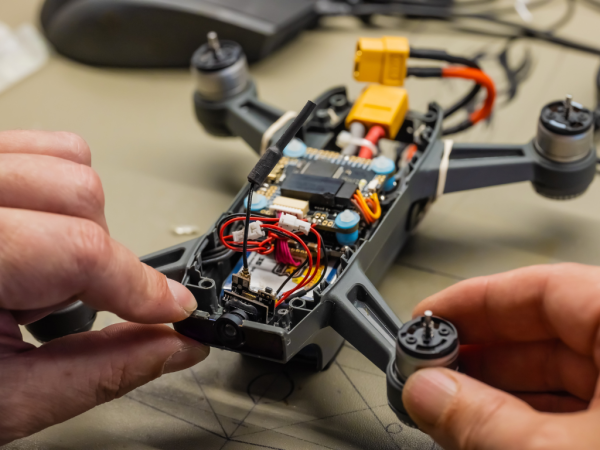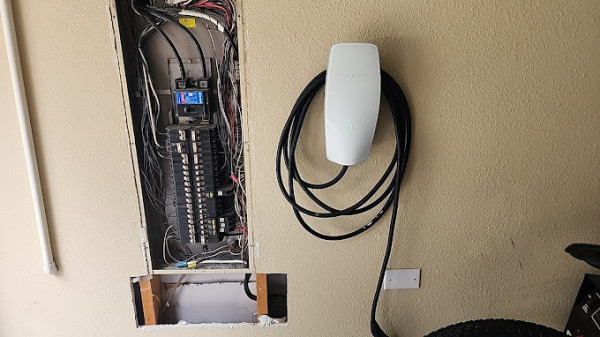-
By
Grand News Network
- Oct 26, 2024
ABR Electric, based in McKinney, TX, is addressing a growing issue for electric vehicle (EV) owners who are facing "nuisance tripping" with their home charging stations due to new requirements from the 2020 National Electrical Code (NEC). The updated code mandates Ground Fault Circuit Interrupter (GFCI) breakers for NEMA 14-50 outlets, commonly used for Level 2 EV chargers. While GFCI breakers are crucial for preventing electrical shocks, they can be overly sensitive, causing unnecessary trips that interrupt charging.The problem is particularly common when modern EV chargers like ChargePoint Home Flex perform self-tests or when small current leaks occur due to internal charger components. Environmental factors and installation errors, such as using mismatched breakers, can also contribute to the issue. This leaves homeowners frustrated when they wake up to discover their EV did not charge overnight.To resolve these challenges, ABR Electric recommends upgrading electrical panels to handle the increased load from EV chargers and comply with NEC requirements. Additionally, hardwiring the charger instead of using a plug-in setup can bypass the need for a GFCI breaker and prevent unnecessary tripping.James Adams, Owner and Master Electrician at ABR Electric, highlights the importance of upgrading electrical systems to ensure safe and reliable EV charging.
McKinney, Texas, United States, 26th Oct 2024 – As the electric vehicle (EV) market continues to grow, with brands like Tesla, Rivian, and Ford leading the charge, more homeowners are looking to install home EV charging stations. However, with the adoption of the 2020 National Electrical Code (NEC), EV owners may be facing new challenges—particularly nuisance tripping caused by GFCI (Ground Fault Circuit Interrupter) breakers, a required safety feature that protects against electrical shocks. ABR Electric, a trusted local electrical services company in Collin County, is helping customers understand these changes and find solutions to keep their EV charging stations running smoothly.The updated National Electrical Code (NEC) now mandates GFCI (Ground Fault Circuit Interrupter) protection for NEMA 14-50 outlets, which are commonly used for Level 2 EV chargers. While this safety requirement is essential to prevent electrical shocks, it has introduced unexpected issues for many homeowners, particularly the problem of nuisance tripping. Nuisance tripping occurs when a GFCI breaker trips unnecessarily, often without a clear fault, leaving homeowners frustrated as they discover that their electric vehicle (EV) did not charge overnight. The issue is particularly prevalent when the charger is idle, causing the breaker to trip without any actual charging taking place.This problem arises because GFCI breakers are designed to detect and prevent even minor ground faults, which, while crucial for safety, can be overly sensitive when paired with EV chargers. Modern EV chargers, such as the ChargePoint Home Flex, regularly perform self-tests to ensure proper functionality. During these tests, a small amount of current may leak, triggering the GFCI breaker and causing a trip. In addition, the internal components of the chargers, like EMI (Electromagnetic Interference) filters, can also produce minor leakage currents. When these currents combine, they may exceed the GFCI’s sensitivity threshold, resulting in an unnecessary trip.Other contributing factors include installation errors, such as using a 60-amp GFCI breaker for a 50-amp NEMA 14-50 outlet, which can lead to improper protection and frequent tripping. Environmental conditions, such as moisture in outdoor installations or improper sealing, can further exacerbate the problem by triggering ground faults that don’t pose a real threat but still cause the breaker to trip.In addition to these challenges, many homes are simply not equipped to handle the increased electrical load from EV charging stations. This makes an Electrical Panel upgrade a crucial step in ensuring safe, reliable charging at home. Upgrading your electrical panel allows for better power distribution and helps avoid potential hazards, such as overheating or tripped circuits.Why Homeowners Should Consider an Electrical Panel Upgrade:Increased Electrical Load Capacity: Modern EV chargers require higher amperage, which older panels may not be able to handle. Upgrading ensures your panel can safely support the increased demand.Compliance with NEC Requirements: Upgrading your electrical panel helps meet the latest safety codes, including those related to GFCI protection for EV charging stations.Improved Reliability: By upgrading, homeowners can reduce the risk of frequent trips and interruptions in power, ensuring a smoother, uninterrupted charging experience.Enhanced Safety: An upgraded panel helps prevent overloading circuits, reducing the risk of electrical fires, overheating, and other safety concerns.Future-Proofing: As more household appliances and systems transition to electric, upgrading your electrical panel prepares your home for future needs and technologies.James Adams, Owner and Master Electrician at ABR Electric, explains: “We’ve seen this issue arise more frequently, especially with newer electric vehicles. Homeowners will plug in their car, expecting it to charge, but wake up to find the breaker tripped sometime during the night. It’s a real frustration, and it’s important that EV owners are aware of how the new code impacts their charging setup.”In a recent video, Adams further discusses the challenges brought on by NEC Article 625.54, which requires GFCI breakers for EV charging circuits. “Until the 2020 code, you could use a regular breaker for a NEMA 14-50 plug, but now GFCI protection is required. The problem is, GFCI breakers can be too sensitive when used with some electric cars, causing these nuisance trips,” Adams says. “We’ve even run into older homes where you simply can’t install a GFCI breaker because the panel isn’t compatible.”For homeowners in this situation, ABR Electric offers tailored solutions. Hardwiring the EV charger directly to the circuit, instead of using a plug-in configuration, can often eliminate the need for a GFCI breaker altogether. This can prevent unnecessary trips and ensure a more reliable charging experience.“Hardwiring your charger is one of the best ways to avoid nuisance tripping,” says Adams. “If you’re smart enough to buy an electric car, you’re smart enough to think through these details and ensure that your charging setup works smoothly. The last thing you want is to wake up with an uncharged vehicle because of a tripped breaker.”ABR Electric encourages Collin County residents who are considering EV home charging installations to consult with professional electricians to ensure proper installation and compliance with the latest NEC requirements. With over 20 years of experience, ABR Electric is committed to delivering safe and reliable electrical services, ranging from EV charging installations and ceiling fan installations to whole-house surge protection and electrical panel upgrades.For more information or to schedule an appointment, contact ABR Electric at 214-690-1941 or visit our website belowAbout ABR ElectricABR Electric is a locally owned and operated electrical services company serving McKinney, TX, and the surrounding Collin County area. Specializing in residential and commercial electrical services, ABR Electric is known for its expertise in EV charging installation, electrical panel upgrades, lighting installations, and more. With a commitment to quality, safety, and customer satisfaction, ABR Electric in Collin County is a trusted name in the electrical industry.
Media Contact
Organization: ABR Electric
Contact Person: James Adams
Website: https://abrelectric.com/
Email: Send Email
Contact Number: +12146901941
Address:1971 Univ Business Dr #106, McKinney, TX 75071
City: McKinney
State: Texas
Country:United States
Release id:19041












